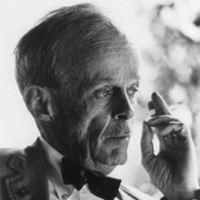Ode to the Confederate Dead by Allen Tate: Summary and Analysis
Allen Tate, an American poet and critic, aims to revitalize the southern values in his moat acknowledged poem Ode to the Confederate Dead. This long poem is a subtype of graveyard poetry where he tries to re-energies the southern values along with the memory of the dead soldiers.

Allen Tate (1899-1979)
This poem is said to have been influenced by T.S. Eliot. For the long time, after the Civil war, the South was in the defeated mentality and the writers of the time had the challenge to re-energize the south. Allen Tate through this poem tries to celebrate the traditional norms and values and beliefs of Southern civil war soldiers.
The speaker is in the graveyard of dead Southern Civil war soldiers, who had the same objectives, goals, dreams and values. The speaker visits the graveyard in order to find the headstones where the details of the dead soldiers have been written. He shows that the Southern society has forgotten their heroes, who had fought with the certainty of vision in the arrogant time in the history; Southerners today have forgotten their circumstances, the contribution and the vision. Therefore, the Southern heroes have been limited to the graveyard and headstones. He suggests the Southern society to respect and acknowledge the contribution of the dead soldiers. After meditating on the fate of dead civil war soldiers in the graveyard, the speaker meditates on death in the final verse.
The speaker is in the graveyard and the observation of the headstones of the dead Southern Civil war soldiers makes him think upon death. Since the speaker is in the graveyard, he asks himself to leave from the place. In the last stanza, he presents serpent, symbol of death, as gentle. Presenting serpent as green, the speaker suggests that death is eternal and timeless. It riots with his tongue through the silence; death comes without any sign, with no information. The last line gives the idea that death is the sentinel of the grave and it excuses no one. "Sentinel of the grave who counts us all! And conveys the message that no one can escape death. All human is bound to be counted by death. Being a subtype of graveyard poetry, the extract reminds all the people about the inevitable phenomenon of human life, i.e. the death.
If we look at the couplets separated from the rest of the poem, the words like wind and leaves are being repeated. The speaker repeatedly informs that the wind is blowing and the leaves are flying in order to plunge and expire. In the concluding stanza of the poem, we are taken to the graveyard where the serpent is the sentinel, “who counts us all”. The serpent counts from the graveyard means to say it is supervising the death of human. We all are counted and no one is excused. In the world where all the things change, death alone is permanent. Today or tomorrow, we have to go to the same graveyard. In this respect, leaves and the wind are the images standing for the life and death respectively. We are like the leaves waiting to be blown by the wind. But that blowing is inevitable.
The civil war soldiers had fought to protect the south. They had the certainty of the vision. Despite the arrogant circumstances they had the vision to protect the south. They fought with what they could. After their death, they have been remembered. But our impression proves to be wrong when the wind whirrs without recollection. The southern soldiers have been erased from the memory of the southerners. No one remembers their heroism and certainty of the vision in the arrogant circumstances.
A society can be healthy, civilized and energized when we acknowledge all the contributions of the past. Death had to come whether we do anything or not. But a healthy society continues when we respect our predecessors. But unfortunately we have been transformed into the blind crab for the stone which does not see and feel anything. Though soldiers died physically leaving their heroism behind, the southerners have been dead emotionally and psychologically despite being physically live. So, it is an ironic attack upon ourselves and the southerners.
